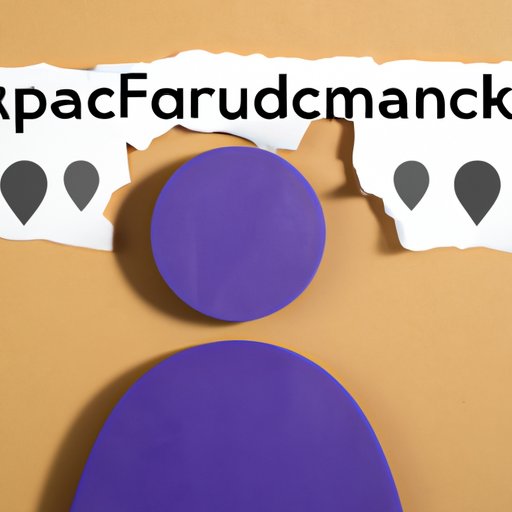
Introduction
Deleting Facebook is becoming a popular choice for many people in recent years. Whether it’s due to concerns about digital privacy, mental health, or just a general desire to disconnect from social media, deleting your Facebook account can be a great decision. In this article, we’ll provide a step-by-step guide to deleting your account, explain the benefits of doing so, offer tips for protecting your privacy, and more.
The Step-by-Step Guide to Deleting Your Facebook Account
The process of deleting your Facebook account is relatively straightforward, but it’s important to follow each step carefully. Here’s what you need to do:
- Log in to your Facebook account and click the menu icon in the top right corner.
- Select “Settings & Privacy” and then “Settings.”
- Choose “Your Facebook Information” from the left-hand menu.
- Select “Deactivation and Deletion.”
- Click “Permanently Delete Account” and follow the on-screen instructions.
It’s worth noting that once you initiate the process of deleting your account, Facebook will give you 30 days to change your mind and cancel the deletion. After that point, your account will be permanently deleted and cannot be recovered.
Why Deleting Your Facebook Account May Be the Best Decision You Make and How to Do It
There are many reasons why someone might choose to delete their Facebook account. For one thing, social media can be a major source of stress and anxiety for many people. With the constant pressure to present a curated, idealized version of ourselves online, it’s easy to feel overwhelmed, inadequate, or even depressed. Deleting Facebook can be a great way to reduce this stress and improve your mental health overall.
In addition, Facebook has been at the center of many controversies in recent years, particularly around issues of data privacy. If you’re concerned about protecting your personal information online, deleting Facebook can be a way to take control of your digital footprint and reduce your risk of being hacked, scammed, or otherwise compromised.
5 Simple Steps to Delete Your Facebook Account Permanently
Let’s take a closer look at the steps required to permanently delete your Facebook account:
- Backup your data (if desired) by selecting “Download Your Information” in the “Your Facebook Information” section of your settings.
- Log into your Facebook account and navigate to the “Delete Your Account and Information” page.
- Click “Delete Account” and enter your password.
- Follow the on-screen instructions to confirm your account deletion.
- Avoid logging back into your Facebook account for the next 30 days, or the deletion process may be canceled.
It’s also worth noting that you can deactivate your Facebook account without permanently deleting it. This allows you to take a break from social media without losing your profile, photos, or other data. To do so, simply go to the “Deactivation and Deletion” section of your Facebook settings and follow the instructions.
Deleting Your Facebook Account: How to Protect Your Privacy and Say Goodbye to Social Media
While deleting your Facebook account can be a great way to take control of your online presence, it’s important to be aware of the potential risks and to take steps to protect your privacy. Here are some tips:
- Before deleting your account, take some time to review your privacy settings and adjust them as necessary to limit who can see your personal information or activity on Facebook.
- If you’re concerned about friends or family members still being able to access your content on Facebook after you delete your account, consider reaching out to them beforehand to let them know about your decision and to ask them to respect your privacy.
- Once your account is deleted, be aware that some of your data may still be accessible to Facebook or third-party apps that previously had access to your account. Consider using a privacy tool like a VPN or encrypted messaging app to protect your information moving forward.
In terms of saying goodbye to social media altogether, there are plenty of alternatives to Facebook that you might consider exploring. Instagram, Twitter, and LinkedIn are all popular choices, or you might opt to try a completely different kind of activity or hobby to fill the void left by social media.
Breaking Up with Facebook: A Beginner’s Guide to Removing Your Account
To summarize, deleting your Facebook account can be a great way to improve your mental health, protect your digital privacy, and take control of your online presence. By following the simple steps outlined in this article, you can permanently delete your account and say goodbye to social media for good.
Conclusion
At the end of the day, deleting your Facebook account is a very personal decision that will depend on your individual needs and priorities. However, if you’re feeling overwhelmed or concerned about your privacy online, it may be worth considering. We hope that this guide has provided you with the information and tools you need to make an informed decision about what’s right for you.




